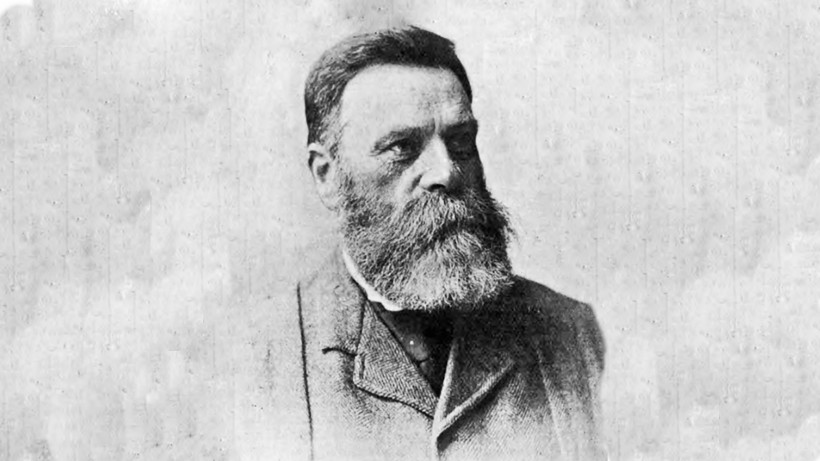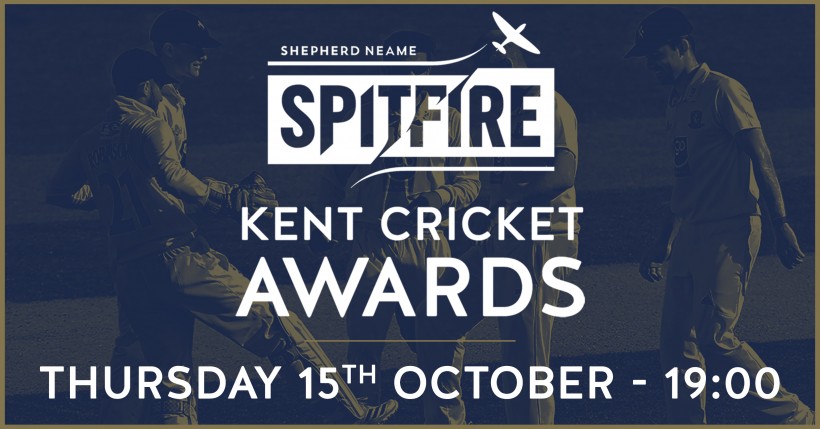William McCanlis: Kent Cricket visionary
Tuesday 13th October 2020

This season’s Spitfire Kent Cricket Awards took place on Thursday 15th October from 19:00, where the Club came together to celebrate the achievements of both the Kent Men’s and Women’s squads in 2020.
Established for the first time in 2020 are two new awards: ‘Moment of the Season’, given to either a team or individual performance that stood-out from the season, and the ‘Emerging Player of the Year’ Award, given to a player that has shown the most promise at the start of their Kent career.
Marcus O’Riordan, the winner of the Emerging Player of the Year award, received The McCanlis Cup, an accolade named after one of the men responsible for the nurturing of talent of legendary players in the ‘Tonbridge Nursery’ at the turn of the 20th Century; William “Captain” McCanlis.
McCanlis was a useful, hard-hitting batsman, generally seen at his best when runs were at a premium. As a bowler, he was a handy change in first-class cricket and rather more than that in services cricket and at club level.
His true fame rests however on his years in charge of the Kent Nursery at Tonbridge.
To quote Lord Harris himself in A Few Short Runs, ‘the success of our Nursery pre-war was almost solely due to McCanlis’s ‘experience and eminent capacity’. McCanlis describes his coaching methods at some length in the 1907 Wisden. Seen in the light of modern coaching techniques it all sounds pretty primitive but at the time properly structured coaching was almost unknown outside a few public schools.
Whether developing ‘natural’ talents such as Colin Blythe or Frank Woolley or getting the best out of the less gifted such as George Collins, he was ahead of his time. Not the least of his contribution was that, by restricting the length of time his young hopefuls could bowl in the nets, he protected them from the drudgery of long hours spent bowling to members and their friends.
Although like most good coaches a believer in first principles, the Nursery under McCanlis did not breed stereotypes. It would be hard to find a group of batsmen more disparate in terms of style and method than ‘Wally’ Hardinge, Jack Hubble, Ted Humphreys, David Jennings, Jim Seymour and Frank Woolley.
As for bowlers, given that when he began his career it was still illegal to raise the arm above the shoulder, his achievements were in a way even more remarkable. He not only ‘discovered’ and developed arguably the greatest left-arm spinner of them all, Colin Blythe’. Woolley, a bowler similar in style and not much inferior in skill, attributed much of his success to McCanlis.
Arthur Fielder came to Kent a raw fast bowler straight from village cricket. He trained on to become, day in and day out, the most effective fast bowler in the country, the first to fully exploit the outswinger. 1,150 wickets for the County as well as 26 in six matches for England v Australia are testimony to his quality.
By the end of 1914 Kent had four Championships under their belt and ten capped professionals – Blythe, Fairservice, Fielder, Hardinge, Hubble, Humphreys, Jennings, Preston, Seymour and Woolley – had come through the system. Two more, George Collins and ‘Tich’ Freeeman were capped in 1920.
By the time Woolley retired in 1938, these twelve had contributed 155,300 runs, 276 centuries, and 10,396 wickets to the County as well as 102 England caps.
So abundant was the crop, Kent were able to export – ‘Joe’ Murrell (reluctantly) to Middlesex where he made 342 appearances, Woolley’s elder brother Claud, similarly reluctant to leave, played 362 matches for Northamptonshire (and one for Gloucestershire). Others to move on included Robert Haywood (Northants), Alan Peach (Surrey) and John Vincett (Sussex).
Judged by the yardstick of practical results, McCanlis must rank among the greatest coaches of all time.
In the latter part of his Army career, he was posted to the War Office where he worked alongside Kent Cricket pioneer Lord Harris, who was Under-Secretary of State for War from 1885 to 1890. The two got to know and respect each other and there can be little doubt that McCanlis had been earmarked as future coach. He had already been involved with Kent’s young cricketers.
As early as 1880, McCanlis had twice captained in colts matches and had played for Kent against colts teams led by Lord Harris.
He retired from the Army around the turn of the century but seems to have continued to be involved at Woolwich in some capacity. When the Nursery was set up at Tonbridge in 1897, initially the actual coaching was in the hands of George Webb, head professional at Tonbridge School, and Harry Day, the Tonbridge groundsman, although McCanlis seems to have been in overall command.
In 1897, he was made responsible for talent spotting and signing Colin Blythe. It was not until 1900 that he took over management of the Nursery on a full-time basis. His duties included captaining the Second Eleven and Club & Ground sides which he continued to do until 1911.
He continued playing almost until the outbreak of the 1914-1918 War, before resigning as Kent coach in 1912.
In his letter of resignation he wrote: ‘I have done my best in bringing forward young professionals but I feel the time has arrived when I can best assist the Club by resigning’.
He was rewarded with a vote of thanks at the AGM and presentation of a gold watch. The tribute in the Club’s Annual Report reads:
‘What the Club owes to ‘Captain’ McCanlis for his life-long service to the County as cricketer, counseller, and friend it is impossible to estimate but so far as his coaching is concerned, he has the extreme satisfaction of having lived to see and enjoy the most satisfactory results. He lays down what has been to him a burden of love with the esteem and gratitude of those who have benefitted by his tuition and of all lovers of cricket in Kent, but the Committee congratulate themselves that they can still count on his advice as a colleague.’
Profile adapted from Derek Carlaw’s ‘Kent County Cricketers: A to Z, 1806-1914’
Watch the 2020 Spitfire Kent Cricket Awards here >>>

